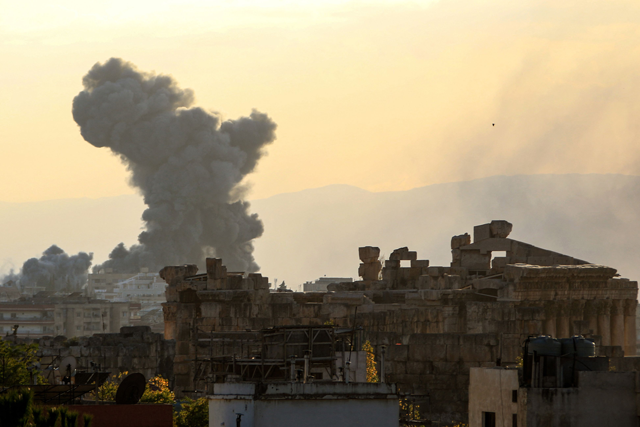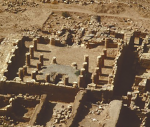You are here
US envoys in Israel to seek Lebanon truce plan
By AFP - Oct 31,2024 - Last updated at Oct 31,2024

Smoke rises from the site of an Israeli airstrike that targeted an area on the outskirts of the eastern Lebanese city of Baalbeck in the Bekaa valley on October 31, 2024. In the foreground the ancient Roman ruins with the Temple of Bacchus can be seen (AFP photo)
OCCUPPIED JERUSALEM — Senior US officials were to meet their Israeli counterparts Thursday to discuss a possible deal to end the conflict in Lebanon and secure Israel's northern border from Hezbollah attacks.
Less than a week before the US presidential election, Washington's envoys Amos Hochstein and Brett McGurk were expected in Israel and Israeli forces continued their fierce ground and air campaign against Hizbollah targets in Lebanon.
On Wednesday, Lebanese Prime Minister Najib Mikati expressed optimism about a ceasefire in "the coming hours or days" and Hizbollah's new leader Naim Qassem said the group would accept a truce under certain conditions.
According to Israeli media reports citing government sources, the plan brokered by the US team would see Hizbollah forces retreat around 30 kilometres from the border, north of the Litani river.
Israeli forces would withdraw from Lebanon and the Lebanese army would then take charge of the border, alongside UN peacekeepers.
Lebanon would be responsible for preventing Hizbollah from rearming itself with imported weapons, and Israel would retain its rights under international law to act in self-defence.
'Sharp conclusion' -
Diplomatic efforts are also underway to agree a short halt to fighting in Gaza, where Israel is pummelling the remnants of Hamas, more than a year after the group launched its unprecedented attack on Israel.
But on Thursday, senior Hamas official Taher Al Nunu told AFP that the group rejected the idea of a short-term pause in the fighting mooted by US and Qatari mediators.
Mediators had hoped that a short pause would create a window to bring in humanitarian aid to Gaza's desperate civilian population and to negotiate a permanent ceasefire. But Hamas rejected this.
"The idea of a temporary pause in the war, only to resume aggression later, is something we have already expressed our position on. Hamas supports a permanent end to the war, not a temporary one," Nunu said.
Any deal to stabilise Israel's front with Lebanon is likely to come first, ahead of any ceasefire for Gaza.
Last week, Israel's chief of general staff Lieutenant General Herzi Halevi said: "In the north, there's a possibility of reaching a sharp conclusion."
On Thursday, Israel pressed its onslaught in Lebanon, which analysts say has put it in a position of strength to strike a deal.
The Israeli military issued an evacuation call for civilians in several areas of southern Lebanon, including the Palestinian refugee camp of Rashidieh.
Previous such warnings in recent days have been swiftly followed by deadly air strikes, and several bombings were reported near the coastal city of Tyre shortly after it was issued.
Syrian state media and an independent war monitor reported that Israel had carried out a strike across Lebanon's border in the Qusayr area.
Three people were killed, according to the Britain-based monitor the Syrian Observatory for Human Rights, when the attack hit "a weapons depot and a fuel storage facility for Hezbollah in the industrial city of Qusayr".
Hizbollah meanwhile kept up its rocket fire on Israel. A rocket strike in the northern town of Metula killed a local farmer and four foreign farm workers, regional council head David Azoulai told AFP.
Hizbollah named Qassem as its new leader on Tuesday, following the assassination of his predecessor Hassan Nasrallah by Israel in a massive air strike last month.
In his first speech since taking over, Qassem said Hizbollah could continue to resist Israeli air and ground attacks in Lebanon for months.
But he also opened the door to a negotiated truce, if presented with an Israeli offer.
"If the Israelis decide that they want to stop the aggression, we say we accept, but under the conditions that we see as appropriate and suitable," he said.
Air strikes
The war in Lebanon began late last month, nearly a year after Hizbollah began low-intensity cross-border fire into Israel in support of Hamas following its October 7, 2023 attack on Israel.
The war has killed at least 1,754 people in Lebanon since September 23, according to an AFP tally of health ministry figures, although the real number is likely to be higher.
The United Nations children's agency UNICEF said on Thursday that the war in Lebanon has caused the death of a least one child per day and wounded an average of 10 since October 4.
Israel's military says it has lost 37 soldiers in Lebanon since ground operations began on September 30.
Related Articles
BEIRUT, Lebanon — Hizbollah told the Lebanese authorities it accepted a ceasefire with Israel the day an Israeli strike killed its leader Ha
OCUUPIED JERUSALEM — The Israeli military carried out air strikes in Lebanon Saturday against Hizbollah activities that it said "posed a thr


















